Global Down Syndrome Foundation Announces Eight Grant Winners At The National Ds Affiliates In Action Conference
February 28th, 2020 by Global Down Syndrome Foundation
Global grants fund a total of 80 jobs for people with Down syndrome in the US and Peru
At DSAIA Leadership Conference; Keynote speaker Zack Gottsagen and Global President & CEO Michelle Sie Whitten with awardees (L-R): Down Syndrome Association of Greater St. Louis, Down Syndrome of Louisville, Down Syndrome Association of Connecticut, Down Syndrome Association of West Michigan, Down Syndrome Association of Delaware (Not Pictured: Down Syndrome Association of Wisconsin, Down Syndrome Network Arizona, Sociedad Peruana de Sindrome Down)
Press Contacts:
Rejena Carmichael | rcarmichael@globaldownsyndrome.org | C: (240) 603-5494
Anca Call | acall@globaldownsyndrome.org | C: (720) 320-3832
Orlando, FL and DENVER, CO February 28, 2020 – Today, Global Down Syndrome Foundation (Global) announced eight new Global Self-Advocate Employment Initiative Grant winners at the national Down Syndrome Affiliates in Action (DSAIA) Annual Leadership Conference.
“We started this grant program in 2016 after attending a DSAIA conference and realized that many Down syndrome organizations cannot afford to employ people with the condition despite advocating for other companies to do so,” said Michelle Sie Whitten, President and CEO of Global. “To address that, we worked with our members on this grant program and we are proud to have supported 80 self-advocates jobs from 20 states and one in Peru! I’m so proud of our team and our members for making this all a reality in such a short time.”
The 2020 winners are: Down Syndrome Association of Connecticut, Down Syndrome Association of Delaware, Down Syndrome Association of Greater St. Louis, Down Syndrome Association of West Michigan, Down Syndrome Association of Wisconsin, Down Syndrome Network (AZ), Down Syndrome of Louisville, and Sociedad Peruana de Sindrome Down (Peru). This year’s Global Self-Advocate Employment Initiative Grants will underwrite self-advocate volunteers transitioning to paid contractors or staff, expansion of hours for self-advocate staff, work-place training, and public speaking training.
Past winners appreciate that Global’s grants can be multi-year, and that many grants have led to leveraged funding.
“Our organization is dedicated to helping our adults with Down syndrome develop vocational and professional skills. We have been fortunate to earn more than one of Global’s transformative employment grants, allowing us to train, prepare, and hire self-advocates for employment especially in our hospital clinic,” says Lauren Camp Gates, Executive Director of Down Syndrome Association of Delaware.
Erin Suelmann, Executive Director of Down Syndrome Association of Greater St. Louis agrees, “Global has helped us expand our ‘Ready to Work Employment Initiative’ programs. In 2018, Global’s grant empowered us to hire an Employment Assistant Ambassador and now we have on-going funding for that position. This year we are so grateful for another grant to grow our staff and hire a Peer Trainer for Social Enterprise.”
2020 grant winners received their award certificates from Whitten and DSAIA conference keynote speaker, Zack Gottsagen. Gottsagen, who starred in the award-winning hit indie film, The Peanut Butter Falcon, is an example of a hardworking individual with Down syndrome excelling in his career. Whitten is an executive producer of The Peanut Butter Falcon and led Global Members in marketing initiatives to ensure the film’s distribution success.
“I wanted to act from the time I was three,” said Gottsagen. “My mom listened to me so I took acting lessons for years. Then two acting coaches wrote a film for me to star in and I won awards for my acting at SXSW and Palm Springs Film Festivals. I showed up, worked hard, got this big break, and presented at the Oscars. It is important that parents and organizations have high expectations and provide training to children and adults with Down syndrome.”
Global membership benefits include supporting life-saving and transformative initiatives, Global’s award-winning magazine Down Syndrome WorldTM, Down syndrome expert webinars, and two first-in-kind grant programs – Global Membership Educational Grants and Global Membership Self-Advocate Employment Initiative Grants. To become a Global Down Syndrome Foundation member or to learn more about member benefits, visit: https://www.globaldownsyndrome.org/become-a-member/.
About Global Down Syndrome Foundation
The Global Down Syndrome Foundation (Global) is the largest non-profit in the U.S. working to save lives and dramatically improve health outcomes for people with Down syndrome. Global has donated more than $32 million to establish the first Down syndrome research institute supporting over 400 scientists and over 2,000 patients with Down syndrome from 28 states and 10 countries. Working closely with Congress and the National Institutes of Health, Global is the lead advocacy organization in the U.S. for Down syndrome research and care. Global has a membership of over 100 Down syndrome organizations worldwide, and is part of a network of Affiliates – the Crnic Institute for Down Syndrome, the Sie Center for Down Syndrome, and the University of Colorado Alzheimer’s and Cognition Center – all on the Anschutz Medical Campus.
Global’s widely-circulated medical publications include Global Medical Care Guidelines for Adults with Down Syndrome, Prenatal Testing and Information about Down Syndrome, and the award-winning magazine Down Syndrome WorldTM. Global also organizes the Be Beautiful Be Yourself Fashion Show, the largest Down syndrome fundraiser in the world. Visit globaldownsyndrome.org and follow us on social media (facebook & twitter:@GDSFoundation)(instagram:@globaldownsyndrome).
What Parents Need to Know About Life Expectancy & Pediatric Medical Care
February 27th, 2020 by Global Down Syndrome Foundation
From Down Syndrome WorldTM 2019 Issue 4 of 4
Dr. Fran Hickey, a parent to a son with Down Syndrome with over 30 years experience caring for children with Down Syndrome, provides insights and important takeaways
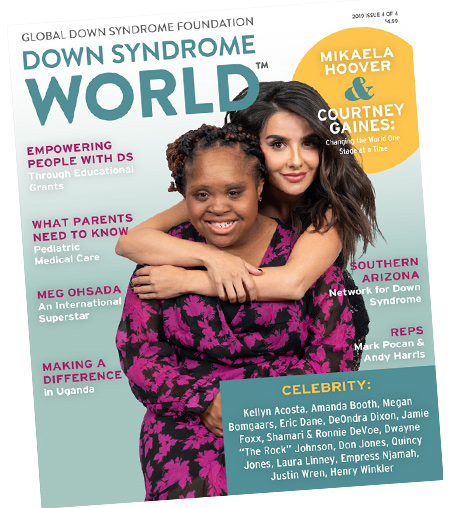 This article was published in the award-winning Down Syndrome World™ magazine. Become a member to read all the articles and get future issues delivered to your door!
This article was published in the award-winning Down Syndrome World™ magazine. Become a member to read all the articles and get future issues delivered to your door! ACCORDING TO THE CENTERS FOR DISEASE CONTROL AND PREVENTION (CDC), approximately 6,000 people are born with Down syndrome in the United States every year. The average life expectancy of a person with Down syndrome has more than doubled since the 1980s – from 25 years to 60 years today. The dramatic increase in lifespan for people with Down syndrome over the last 30 odd years can be attributed to many factors. First, there was the dismantling of inhumane institutions in the 1980s and early 1990s where people with intellectual and developmental disabilities to be placed in institutions where they were not provided basic medical care, let alone life-saving procedures such as appendectomies or heart surgery. In fact, at the notorious Willowbrook State School on Staten Island, New York, there was no plumbing and residents were injected with diseases in an attempt to discover cures over a sixteen-year period. It was finally closed in 1987.
With deinstitutionalization came more inclusion at home, in schools, and eventually society – all of which also play a role in health outcomes. In addition, since an estimated 40-50% of children with Down syndrome are born with a congenital heart defect, another big factor leading to increased lifespan was advancement in cardiac repair and surgery.
While basic and even clinical research has languished for people with Down syndrome even until recently, medical care has progressed significantly over these same decades. An important resource that has made a substantial difference in health outcomes is the publication of Health Supervision for Children with Down Syndrome by the American Academy of Pediatrics (AAP).
“The best thing a parent can do for their child with Down syndrome is to utilize the pediatric care guidelines set by American Academy of Pediatrics,” says Dr. Fran Hickey, a beloved Down syndrome expert and the medical director of the Anna and John J. Sie Center for Down Syndrome at Children’s Hospital Colorado.
The Sie Center, part of the Crnic Institute for Down Syndrome and an affiliate of the Global Down Syndrome Foundation, was established in November 2010 and now has nine weekly clinics including a feeding clinic, sleep clinic, education clinic, and mental wellness clinic. The center is also home to other renowned medical providers including Patricia C. Winders, PT; Dee Daniels, RN, MSN, CPNP; and Dr. Lina Patel, PsyD. Together, they serve over 1,800 patients from 28 states and 10 countries.
THE NEED FOR A DOWN SYNDROME-SPECIFIC RESOURCE
People with Down syndrome are born with three copies of chromosome 21 instead of two. The result is a dramatically different disease profile whereby people with Down syndrome are highly predisposed to certain diseases (e.g. Alzheimer’s disease and autoimmune diseases) and highly protected from others (e.g. solid tumor cancers, certain heart attacks and stroke). As such they require different medical care visits compared to those in the general population or other intellectual and developmental disabilities.
Despite being underfunded, the Down syndrome community has benefitted from the guidelines organized between 1981 and 1999 by dedicated clinicians, many from the Down Syndrome Medical Interest Group, who drew primarily on their vast experience with this patient population. Then in 2000, with the leadership of Dr. Marilyn Bull and many other contributors, the American Academy of Pediatrics used its resources, vast network, and peer reviewed vetting apparatus to create its first Health Supervision for Children with Down Syndrome. The guideline was last updated in 2011.
The AAP’s Health Supervision for Children with Down Syndrome is a comprehensive report of healthcare guidelines for children with Down syndrome from birth to 21 years of age. While it is designed for the pediatrician and subspecialists caring for child with Down syndrome, there is an 11-page family-friendly version also published by the AAP called “Health Care Information for Families of Children with Down Syndrome.”
A RENOWNED AND BELOVED DOCTOR
Dr. Hickey completed his undergraduate degree at Harvard University and his medical degree at University of Cincinnati College of Medicine, and his internship and residency at Cincinnati Children’s Hospital where he was mentored by Dr. Bonnie Patterson, a national leader in Down syndrome founded the renowned Thomas Center for Down Syndrome and DSMIG. Dr. Hickey is recognized as one of “America’s Top Doctors,” and has received numerous awards including the Maxwell J. Schleifer Distinguished Service Award from Exceptional Parenting Magazine, The Ross Award for Excellence in Ambulatory Pediatrics, the Senior Resident Teaching Award in Pediatrics, the Professional of the Year award, and Lifetime Achievement Award from the Down Syndrome Association of Greater Cincinnati. He and his wife Kris have four children, one of whom has the dual diagnosis of Down syndrome and autism.
Today, Dr. Hickey and his multi-disciplinary team of experts at the Sie Center for Down Syndrome at Children’s Hospital Colorado provide excellent medical care and conduct many research projects related to improving healthcare outcomes through improved medical care therapies, mental wellness and school interventions and therapies, as well as through applying the AAP Health Supervision for Children with Down Syndrome guidelines.
Dr. Hickey encourages parents to work closely with their medical team to determine the proper healthcare plan for their child’s specific needs. “Anyone who is providing care to a child or adolescent with Down syndrome should be aware of common co-occurring conditions and have a specific plan to monitor and evaluate the child’s health,” says Dr. Hickey.
As a supplement to the AAP pediatric guidelines, Dr. Hickey and his “Dream Team” of experts at the Sie Center have developed a simple one-page check-list and chart based on the AAP guidelines that lays out a roadmap of appointments, screenings, vaccines, and treatments. “The AAP has endorsed these guidelines to maximize the health of our children,” Dr. Hickey says. “They are so important to follow as long-term health guidelines and to allow children with Down syndrome to reach their health potential.”
“The AAP guidelines and Sie Center’s guidelines check-list are so important because they provide medical professionals a roadmap on how children with Down syndrome need different medical care,” says Michelle Sie Whitten, President & CEO of the Global Down Syndrome Foundation. “For example, a typical child may only get a hearing test if there is some evidence that child is not hearing. For children with Down syndrome who tend to have inner ear issues, they must get tested every year. You can imagine what not hearing does to our children’s lives.”
INSIGHTS AND TAKEAWAYS FROM DR. HICKEY
The AAP 2011 guidelines can be broken down into medical areas of focus and by age group. In september 2019, Dr. Hickey provided an informative webinar to over 100 attendees about the guidelines. Below are key insights and takeaways from Dr. Hickey’s webinar.
NEONATAL (BIRTH TO ONE MONTH)
In an infant’s first 24 hours of life, he/she will receive a physical examination for the state newborn screening, a public health service that tests for a variety of health disorders, including Down syndrome. If there was no prenatal testing and if the clinician feels enough criteria are present on physical examination to diagnose the baby with Down syndrome, then a blood sample should be sent for chromosome evaluation. Providing a diagnosis at birth should be done with care and counseling, and resources should be offered at the appropriate time.
There is a high rate of neonatal complications for newborns with Down syndrome; the overwhelming majority of which can be addressed and/or corrected. According to an article published by the Sie Center representing data from the Colorado mountain (an elevated region), an estimated 73% of newborns require a stay in a Neonatal Intensive Care Unit (NICU),which underscores the importance of appropriate medical readiness and intervention from birth to discharge. Well over half of these NICU stays are driven by additional oxygen needs, and approximately 60% require phototherapy to treat jaundice. Another driver of NICU stays are feeding problems which may require a nasogastric tube (NG tube).
CONGENITAL HEART DISEASE & PULMONARY HYPERTENSION
Congenital heart disease (CHD) and pulmonary hypertension (PH) go hand-in-hand. Since almost half of the babies with Down syndrome are born with a CHD, a newborn echocardiogram is imperative. This will show if and which exact heart abnormalities exist. In addition, every newborn should be evaluated for PH. PH compromises blood flow from the heart to the lungs due to tiny arteries in the lungs becoming narrowed, blocked or destroyed. This slowing or blockage of blood flow to the lungs puts undue stress on the heart.
An estimated 20% of 50% of babies with Down syndrome having CHD will need surgery within the first 4 months. The advancement of infant heart surgery has seen outcomes for all patients with CHD improve dramatically. Even with a more serious CHD that requires open heart surgery, the survival rate is well above 90% if caught in time.
Compared to the typical population with CHD, the prevalence of PH is still high. Signs to look for are hypoxia, polycythemia, obstructive sleep apnea, and feeding problems and aspiration. Keeping children with Down syndrome appropriately oxygenated is integral for prevention and treatment of PH.
HEARING
In the United States, all newborns get a newborn hearing screen. Approximately 20% of newborns with Down syndrome will initially fail. But only 2% have congenital hearing loss. The guidelines recommend a rescreen at 6 months with a Behavioral Audiogram. Hearing tests should continue every six months until 3 years of age after which children with Down syndrome should get their hearing tested annually.
An estimated 30-40% of infants with Down syndrome have stenotic ear canals (narrow ear canals), which makes it difficult to see the tympanic membrane and evaluate hearing. If a child with Down syndrome has stenotic ear canals, he/she should see an otolaryngologist or Ears, Nose, Throat (ENT) specialist for an otoscope with a microscope in order to avoid undiagnosed serous. otitis media and subsequent hearing loss. Clearly, hearing loss will not only impede the development of speech, but may also affect many other developmental milestones.
LEUKEMIA
Every newborn with Down syndrome should have a hematology test called a “complete blood count” (CBC). While only 2% of people with Down syndrome will have leukemia, this is still 10x or even 400x more frequent than in the typical population and more specialized treatments for children with Down syndrome are needed based on their. potentially different anatomical structure and reactions to medications.
Up to 30% of newborns with Down syndrome present with Transient Myeloproliferative Disorder (TMD). Twenty percent of those 30% will go on to get diagnosed with leukemia. Counseling the parents during such a diagnosis is very important. The two leukemia’s children with Down syndrome are more susceptible to are Acute Megakaryoblastic Leukemia (AMKL), a rare form of myeloid leukemia (ages 1-5), and B-cell Acute Lymphoblastic Leukemia (ALL), a common childhood leukemia (primarily ages 5 to 20).
AUTOIMMUNE DISORDERS
It’s estimated that up to 70% of people with Down syndrome have one or more autoimmune disorder. At birth, babies have a newborn state screen that includes measuring thyroid with a test called T4. If a newborn fails this test, they will then have a thyroid stimulating hormone (TSH) test.
Because of the prevalence of autoimmune disorders (e.g. abnormal thyroid, hypothyroidism, diabetes mellitus, alopecia areata) the AAP guidelines recommend TSH screenings at 6, 12, and 18 months. Then starting at the age of 2, testing every year unless there are symptoms of thyroid dysfunction, in which case an immediate test should be administered.
The AAP guidelines have many other important recommendations including testing or obstructive sleep apnea (OSA) at 4 years old (or earlier if there are symptom). Over 60% of children with Down syndrome test positive to OSA whereby they are not breathing during certain times while sleeping. Respiratory illnesses are the cause of 80% of admissions to the hospital for children with Down syndrome, so mitigating exposure and treating ailments quickly is paramount.
The AAP guidelines cover ophthalmology, autism, gastrointestinal issues, and many other important areas. It is exciting to know that the AAP is working on an updated version, that will no doubt provide clinicians and families even more ways in which to ensure the good health of children with Down syndrome.
“While there are challenges, the developments in recent years paint a hopeful picture of medical care for people with Down syndrome, allowing us to help children reach their potential and enjoy their life,” says Dr. Hickey.
As a membership benefit, Global Down Syndrome Foundation hosts a quarterly webinar series on medical and educational topics such as Down syndrome research, healthcare, advocacy, and more. See a recap of Dr. Hickey’s September 2019 webinar on Pediatric Medical Care here: www.globaldownsyndrome.org/globalwebinar-series-fall-2019-recap/
Like this article? Join Global Down Syndrome Foundation’s Membership program today to receive 4 issues of the quarterly award-winning publication, plus access to 4 seasonal educational Webinar Series, and eligibility to apply for Global’s Employment and Educational Grants.
Register today at downsyndromeworld.org!
Global Webinar – Medical Care Guidelines
January 9th, 2020 by Global Down Syndrome Foundation
Global Medical Care Guidelines for Adults with Down Syndrome: A Legacy Supporter Update!
What You Need to Know
Overview & Speakers:
We look forward to sharing our progress and to providing a sneak peek with you at our exclusive webinar for our generous Global Members and guideline supporters. This webinar is in addition to our quarterly Global Membership webinar series and is an exclusive, free benefit to YOU our Legacy Supporters. In this webinar Global President and CEO, Michelle Sie Whitten, and Director of Adult Initiatives & Special Projects, Bryn Gelaro, to present on the following topics:
• Results from our focus groups
• Success stories (already)
• PICOTS & Grade System framework
• Managing Expectations – what the guidelines do and do not include
• Overachieving! Possible Toolkits…
• Distribution, Education & Outreach
• How you can help
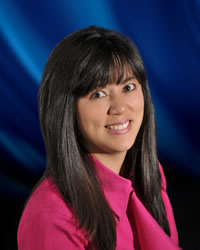 Michelle Sie Whitten, MA |
Michelle Sie Whitten, MA is the Co-Founder, President and CEO of the Global Down Syndrome Foundation (Global). Global is dedicated to significantly improving the lives of people with Down syndrome through Research, Medical Care, Education, and Advocacy. Prior to her career in the non-profit sector, Michelle was a cable TV pioneer in East Asia working for Liberty Media Corporation and Starz Encore. Her academic career was focused on international security and diplomacy and she holds a Masters degree and business certificate from Harvard University. She graduated Magna Cum Laude with a Bachelors degree from Tufts University and studied Mandarin Chinese and Women Studies at Peking University. Michelle is married to Tom, a British curator of Chinese contemporary art and they have two adorable kids, one of whom has Down syndrome. |
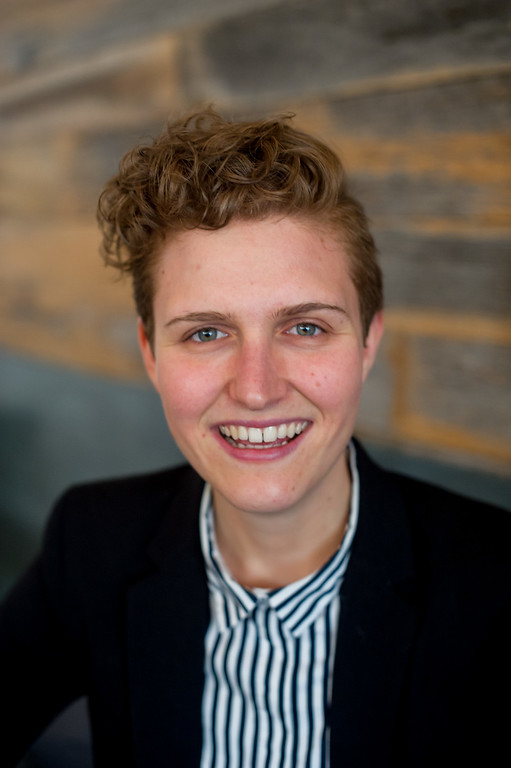 Bryn Gelaro, LSW |
Bryn Gelaro, LSW is a Licensed Social Worker with background in behavioral health with adults with Down syndrome. Bryn was a consultant for the Global Down Syndrome Foundation from 2015 to 2017 prior to her current position as the Director of Adult Initiatives and Special Projects. Her work includes supporting Global’s efforts to open a World Class Medical Clinic for adults with Down syndrome and overseeing international projects, including in Uganda and Albania. Bryn is the co-Author and project manager for the Global Medical Care Guidelines for Adults with Down Syndrome overseeing the communication between work group members, maintaining guideline deliverables and timeline, and managing the edits of the guideline manuscript. Bryn earned her Bachelor of Science in Psychology from the Pennsylvania State University and a Masters degree in social work from the University of Chicago. She completed her Master’s graduate field training at the Adult Down Syndrome Clinic in Chicago where she was fortunate to have mentorship from Dr. Dennis McGuire and Dr. Brian Chicoine. |
Powerpoint Presentation: Click to Download
Important Notice
The Global Down Syndrome Foundation’s employees and/or volunteers are NOT acting as your medical professional or attorney. Responses you receive via electronic mail, phone, or in any other manner DO NOT create or constitute a doctor-patient or attorney-client relationship between you and the Global Down Syndrome Foundation (Global), or any employee of, or other person associated with, Global.
Information received from Global’s employees or volunteers, or from this website, should NOT be considered a substitute for the advice of a medical professional or lawyer. Globaldownsyndrome.org DOES NOT provide any medical or legal advice. You should consult with your own doctor or lawyer for medical or legal advice. This website is a general service that provides information over the internet. The information contained on this website is general information and should not be construed as medical advice to be applied to any specific factual situations.
Global Webinars:
Winter 2019: CPAP, Hearing Aids, & Glasses, Oh My! How to Help my Child & Adult Wear their Medical Equipment
Fall 2019: What Families Need to Know: Utilizing the Pediatric Medical Care Guidelines for Down Syndrome
Summer 2019: Self-Advocates Win Landmark Federal Funding for Research: Join Global – Join the Movement
Spring 2019: Take A Deep Breath: Lung Infection & Cognition in Down Syndrome
Winter 2018: Physical Therapy for Children with Down syndrome & How to Set your Child Up for Successful Learning Experiences
Fall 2018: Supporting Aging Adults with Down syndrome and Alzheimer’s Disease
Summer 2018: Developing an Individualized Feeding Plan for Your Child with Down Syndrome
Spring 2018: An Unprecedented and Exciting Down Syndrome Research Discovery Engine – The Crnic Institute Human Trisome Project
Winter 2017: Get Moving, Be Awesome! – Physical Therapy & Fitness for Adolescents & Adults with Down Syndrome
Fall 2017: Promoting Skills to Survive & Thrive in the Teen & Adult Years
Summer 2017: Multimodal Approach to Teaching Children with Down syndrome Speech & Language Skills
Spring 2017: Potty Time! A Journey to Successful Toilet Training
$1.4 Trillion Spending Package Signed Into Law By President Trump Sees Bipartisan Results
January 3rd, 2020 by Global Down Syndrome Foundation
Funding Increases for the National Institutes of Health (NIH) and Down Syndrome Research Lauded by Global Down Syndrome Foundation
Photo by Marleen Van den Neste
Press Contacts:
Rejena Carmichael | rcarmichael@globaldownsyndrome.org | C: (240) 603-5494
Anca Call | acall@globaldownsyndrome.org | C: (720) 320-3832
December 22, 2019, Denver, CO– On Friday, President Trump signed a $1.4 trillion spending package that will fund the government until September 2020 and averted a government shutdown. Earlier in the week, the package passed the House and Senate with victories and compromises on both sides of the aisle.
“Finally, we have secured the funds and resources for our military — our national security,” said Senator Richard Shelby (R-AL), Chairman of the Senate Appropriations Committee who also heads the appropriations subcommittee on defense. “This package includes a significant increase in defense funding and the largest pay raise in a decade for our men and women in uniform.”
Chairwoman of the House Appropriations Committee Nita Lowey was also pleased with the results, “I am particularly proud that House Democrats prevailed in securing historic investments For the People, including record funding levels for Head Start and lifesaving medical research at NIH, and in funding priorities vital to our shared security, like gun violence prevention research and election security grants to states.”
Included in the spending package was legislation providing a 7% increase or $2.6 billion more funding to the NIH for an annualized budget of $41.7 billion. Legislation also highlights a “minimum” of $60 million for Down syndrome research in FY2020 through NIH’s Investigation of Co-occurring Conditions Across the Lifespan to Understand Down Syndrome (INCLUDE) trans-NIH project. This would bring total Down syndrome research funding up to $98 million for the year.
Michelle Sie Whitten, President & CEO of the Global Down Syndrome Foundation, issued the following statement:
“Global thanks the Administration, our champions in Congress, and leadership at NIH who made Down syndrome research and medical care a priority resulting in the NIH INCLUDE project. It is important to note that this result reflects a decade of hard work and two decades of inequity in funding for our Down syndrome community.
The key turning point was the Labor, Health and Human Services, Education and Related Agencies House Appropriations Subcommittee hearing on Down syndrome research in October 2017. At the hearing, testimony from Global Ambassador, Frank Stephens, received a standing ovation, 100% bipartisan support, and over 150 million views on C-Span and other outlets.
This first ever hearing of its kind and testimonies were made possible by Congresswoman Cathy McMorris Rodgers, Chairwoman Rosa DeLauro, and Ranking Member Tom Cole with further support from Senators Roy Blunt, Patty Murray, and so many others from both sides of the aisle.
The FY2020 budget for NIH and Down syndrome research signals a clear message that the longevity and improved health outcomes of people with Down syndrome is important, and that their unique disease experience can also benefit others without Down syndrome. Global is proud and incredibly grateful to have worked with the Administration, NIH, and Congress to secure the funding for this research.”
The INCLUDE project focuses on diseases and conditions like Alzheimer’s, blood cancers, and autoimmune disorders that have a higher prevalence among individuals with an extra copy of chromosome 21 as well as conditions like solid tumor cancers that are rare among individuals with Down syndrome. The INCLUDE Steering Committee is chaired by Dr. Lawrence Tabak, NIH Principal Deputy Director in partnership with Dr. Diana Bianchi, Director of the Eunice Kennedy Shriver National Institute of Child Health and Human Development (NICHD), and Dr. Gary Gibbons, Director, National Heart, Lung, and Blood Institute (NHLBI) as co-chairs.
To learn more about the NIH INCLUDE project, visit https://www.nih.gov/include-project/include-project-research-plan#leadership
To learn more about the Crnic Institute for Down Syndrome, visit https://medschool.cuanschutz.edu/linda-crnic-institute
To learn more about the Global Down Syndrome Foundation, visit www.globaldownsyndrome.org
About Global Down Syndrome Foundation
The Global Down Syndrome Foundation is at the forefront of Research, Medical Care, Education, and Advocacy dedicated to significantly improving the lives of people with Down syndrome. Global supports the research of hundreds of scientists around the world through their advocates, partners and affiliates, including the Crnic Institute for Down Syndrome, the Rocky Mountain Alzheimer’s Disease Center, the Anna and John J. Sie Center for Down Syndrome, and a new pilot Adult Clinic. Global invites its supporters to celebrate over a decade of milestones in helping people with Down syndrome at their Be Beautiful Be Yourself Fashion Show. To learn more, please visit www.globaldownsyndrome.org and www.bebeautifulbeyourself.org.
Global Webinar Series – Winter 2019 Recap
December 16th, 2019 by Global Down Syndrome Foundation
WINTER 2019
CPAP, Hearing Aids, & Glasses, Oh My! How to Help my Child & Adult Wear their Medical Equipment
What You Need to Know
Overview & Speakers:
This webinar will explain the frequency of diagnoses and importance of adherence to help your child and/or adult wear their medical equipment. Key takeaways include:
• Common types of challenging behaviors that children and adults with Down syndrome may have when working to wear medical equipment
• A step-by-step plan for increasing use of medical equipment
• Motivators for avoiding wearing medical equipment and how to manage these behaviors
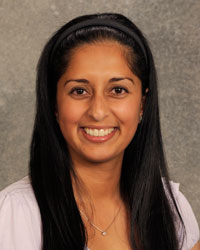 |
Lina Patel, PsyD joined the Sie Center for Down Syndrome at Children’s Hospital Colorado as Director of Psychology in November of 2012. She has extensive experience in treatment planning, parent support, diagnostic evaluation, and intervention. As she believes that behavioral challenges arise for many different reasons, she prides herself in coordination of care with community providers, educational supports, medical team members, and caregivers. Additionally, she conducts clinical research to better understand how neurodevelopment impacts behaviors. |
Overview: Click to Listen
Powerpoint Presentation: Click to Download
Additional Handout: Click to Download
Important Notice
The Global Down Syndrome Foundation’s employees and/or volunteers are NOT acting as your medical professional or attorney. Responses you receive via electronic mail, phone, or in any other manner DO NOT create or constitute a doctor-patient or attorney-client relationship between you and the Global Down Syndrome Foundation (Global), or any employee of, or other person associated with, Global.
Information received from Global’s employees or volunteers, or from this website, should NOT be considered a substitute for the advice of a medical professional or lawyer. Globaldownsyndrome.org DOES NOT provide any medical or legal advice. You should consult with your own doctor or lawyer for medical or legal advice. This website is a general service that provides information over the internet. The information contained on this website is general information and should not be construed as medical advice to be applied to any specific factual situations.
GLOBAL Webinars Archive
2023
2023
2022
2021
2019
CPAP, Hearing Aids, & Glasses, Oh My! How to Help my Child & Adult Wear their Medical Equipment
What Families Need to Know: Utilizing the Pediatric Medical Care Guidelines for Down Syndrome
Self-Advocates Win Landmark Federal Funding for Research: Join GLOBAL – Join the Movement
Take A Deep Breath: Lung Infection & Cognition in Down Syndrome
2018
Be Beautiful Be Yourself Models Press
December 4th, 2019 by Global Down Syndrome Foundation
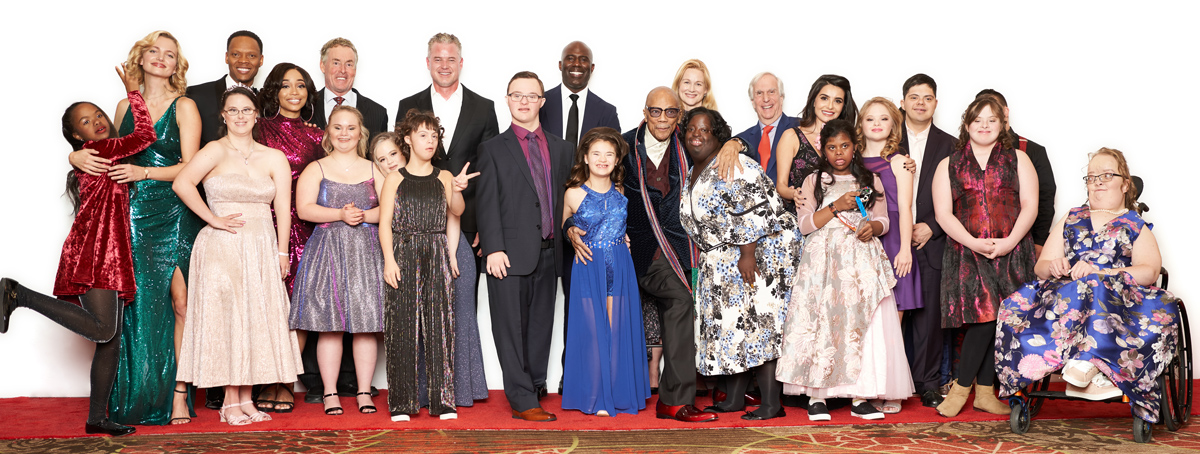
Models In the News:
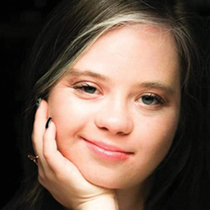 Megan Bomgaars |
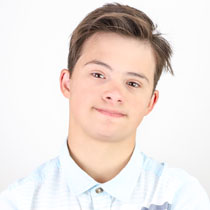 Archie Eicher |
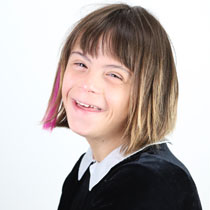 Sevy Eicher |
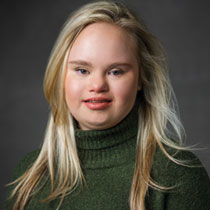 Charlotte Fonfara-LaRose |
 Courtney Gaines |
 Allison McCollam |
Featured Articles:
Shop to Support Global!
December 1st, 2019 by Global Down Syndrome Foundation
Simply start your shopping through this link to AmazonSmile. There is no difference in prices or in products and it’s easy!
Thank you for your continued support of Global Down Syndrome Foundation. We wish you a wonderful holiday season!
The Salah Foundation Gifts $75,000 Matching Grant Toward Classes at Global’s New Education Center
November 7th, 2019 by Global Down Syndrome Foundation
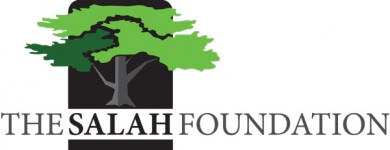
At Global’s 11th annual Be Beautiful Be Yourself Fashion Show, a surprise announcement was made by Noreen Salah Burpee, Executive Director of the Salah Foundation, and delivered by 9News emcees Kim Christiansen and Tom Green. The Salah Foundation matched $75,000 during the live auction that will go to a much-needed Computer Training Class at Global’s new Education Center that was made possible by a transformative $1 million gift from Salah Foundation in 2017.

Global Down Syndrome Foundation Raises Crucial Awareness And $2.5m At Marquee Be Beautiful Be Yourself Fashion Show
November 4th, 2019 by Global Down Syndrome Foundation
Sold-out event attracts over 1,400 guests from 25 states and 10 countries raising life-saving and transformative funds for Down syndrome research and medical care
At Global’s 2019 Be Beautiful Be Yourself Fashion Show: (Left) Quincy Jones presents his namesake award, the Quincy Jones Exceptional Advocacy Award, to supermodel Amanda Booth; (Right) DeOndra Dixon, Jamie Foxx, Charlotte Fonfara-LaRose, Michelle Sie Whitten, Kennedy Garcia, Tim Harris, Megan Bomgaars
Press Contacts:
Rejena Carmichael | rcarmichael@globaldownsyndrome.org | C: (240) 603-5494
Anca Call | acall@globaldownsyndrome.org | C: (720) 320-3832
Denver, CO, Nov 04, 2019 (GLOBE NEWSWIRE) –This past weekend, Global Down Syndrome Foundation (Global) raised a record breaking $2.5 million at their Beautiful Be Yourself Fashion Show, held at the Sheraton Denver Downtown Hotel. Now in its 11th year, Global’s marquee event is the largest fundraiser for Down syndrome in the world, and has now raised a cumulative $20 million.
At the beginning of the night, music icon and legend Quincy Jones, award-winning actors Jamie Foxx, Henry Winkler, Laura Linney, Eric Dane, and John C. McGinley, NFL Hall of Famer Terrell Davis, Colorado Rapids player Kellyn Acosta, R&B musicians Shamari and Ronnie DeVoe, Instagram influencer Mikaela Hoover, and Global Ambassador DeOndra Dixon hit the red carpet while highlighting the alarming disparity of federal Down syndrome research funding.
“The Be Beautiful Be Yourself Fashion Show is important for many reasons,” said Laura Linney. “Events like this call so much needed attention to the research and medical care needed for the Down syndrome community, and that’s why I’m here tonight to support this wonderful cause.”
Later in the evening, 2019 Global Ambassador Charlotte Fonfara-LaRose, Miss Colorado Monica Thompson, and Denver Broncos cheerleaders Jozie, McKenna, and Alexandria joined the line- up and rocked the runway, which featured 22 brilliant models who happen to have Down syndrome. Two models, Letizia Napoleone and Angelina Magdalene hailed all the way from England and India respectively.
Global was honored to have Quincy Jones in person to help present his namesake awards, the Quincy Jones Exceptional Advocacy Awards (Q-Award), to supermodel Amanda Booth and TV star and entrepreneur Megan Bomgaars. Booth, who is also a mother to Micah who happens to have Down syndrome, said “How fortunate am I to have been given such an incredible platform to have my thoughts be heard, and to have my work be validated and recognized. That’s really all I am hoping for, by showing up with my son and demanding that he be on the covers of magazines, and star in commercials. If Down syndrome is recognizable, then it will be familiar, and when something is familiar it is welcome.”
Bomgaars, upon receiving her award, shared an inspirational message, “Since my first Global fashion show, I have really grown as an advocate. I started to really understand that my voice, that our voice, had the power to change the world.”
“This year was a banner year for Global,” says Michelle Sie Whitten, President & CEO of the Global. “With support from our Congressional Champions and leadership at the National Institutes of Health (NIH), we have successfully advocated for a near-tripling of the federal government’s research budget benefitting people with Down syndrome. We are serving over 1,800 pediatric patients from 28 states and 10 countries, while also working on adult care. We are also proud that the film starring our Q-Award winner Zack Gottsagen, The Peanut Butter Falcon, which we executive produced, is now getting Oscar buzz!”
Dr. Joaquín Espinosa, Executive Director of the Crnic Institute for Down Syndrome on the Anschutz Medical Campus, was also effusive, “We are grateful for NIH’s support of our research, allowing us to understand trisomy 21 in much greater detail and to conduct clinical trials of potential treatments for comorbidities in Down syndrome. Global’s partnership and Michelle Sie Whitten’s leadership have been instrumental in securing funding for Down syndrome research that will undoubtedly lead to better health outcomes in people with trisomy 21.”
Another highlight of the evening was a surprise announcement made by Noreen Salah Burpee, Executive Director of the Salah Foundation, and delivered by 9News emcees Kim Christiansen and Tom Green. The Salah Foundation matched $75,000 during the live auction that will go to a much-needed Computer Training Class at Global’s new Education Center that was made possible by a transformative $1 million gift from Salah Foundation in 2017.
Global President and CEO Michelle Sie Whitten and her husband Tom Whitten proudly served as the 2019 Be Beautiful Be Yourself Fashion Show chairs. Past event chairs include Kacey Bingham and Brittany Bowlen, Peter Kudla, Anna and John J. Sie, Sharon Magness Blake and Ernie Blake, Ricki Rest, and Nancy Sevo. Other notables in attendance included past Global Ambassadors Chase Turner Perry, Sophia Kay Whitten, Louis Rotella IV, Markus Sikora, and Clarissa Capuano; and past Q-Award winner Tim Harris.
Proceeds from Global’s Be Beautiful Be Yourself Fashion Show help underwrite life-changing and life-saving research and medical care at Global’s affiliates – the Crnic Institute for Down Syndrome and Rocky Mountain Alzheimer’s Disease Center, both at the Anschutz Medical Campus, and the Sie Center for Down Syndrome at Children’s Hospital Colorado. The fashion show would not be possible without the generosity of Global’s Leadership circle, sponsors, Ambassadors, Q-Awardees, models, Down syndrome partner organizations, celebrities, self- advocates and families.
Missed the event? It’s not too late to get involved! See photos from the event and read all the top media coverage.
To learn more about the Be Beautiful Be Yourself Fashion Show or to donate, visit www.bebeautifulbeyourself.org
To learn more about the Global Down Syndrome Foundation, visit www.globaldownsyndrome.org
About Global Down Syndrome Foundation
The Global Down Syndrome Foundation is at the forefront of Research, Medical Care, Education, and Advocacy dedicated to significantly improving the lives of people with Down syndrome. Global supports the research of hundreds of scientists around the world through their advocates, partners and affiliates, including the Crnic Institute for Down Syndrome, the Rocky Mountain Alzheimer’s Disease Center, the Anna and John J. Sie Center for Down Syndrome, and a new pilot Adult Clinic. Global invites its supporters to celebrate over a decade of milestones in helping people with Down syndrome at their Be Beautiful Be Yourself Fashion Show. To learn more, please visit www.globaldownsyndrome.org and www.bebeautifulbeyourself.org.
Global Webinar Series – Fall 2019 Recap
October 24th, 2019 by Global Down Syndrome Foundation
FALL 2019
What Families Need to Know: Utilizing the Pediatric Medical Care Guidelines for Down Syndrome
What You Need to Know
Overview & Speakers:
This webinar discusses the importance of utilizing the American Academy of Pediatrics Guidelines Health Supervision of patients with Down Syndrome, published in 2011. Find out what families need to know. Key takeaways from this presentation are:
• To better comprehend the utilization of the Guidelines in medical care of our kids
• To recognize the importance of ongoing thyroid, hearing and vision
• To understand the increased risk of respiratory illnesses including pulmonary illnesses, pneumonia, and aspiration in individuals with Down Syndrome
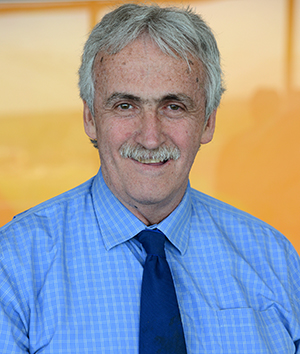 Francis Hickey, MD |
Fran Hickey, MD joined the Linda Crnic Institute for Down Syndrome as Medical Director of its Anna and John J. Sie Center for Down Syndrome in 2010 and he has been involved in the care of individuals with Down syndrome for over 2 decades. Since 2010, Dr. Hickey has organized a multi-disciplinary team of experts interested in children with Down syndrome along with a dedicated research team. He has evaluated nearly 1800 unique individuals with Down Syndrome from across the country and internationally the past 9 years. Sie Center clinics developed include: General Clinics, Infant Clinic, Feeding Clinic, School Age Clinic, Prenatal Clinic, and 2 Sleep Clinics. His research has concentrated on clinical studies involving identification and interventions for comorbidities found in children with Down syndrome. Dr. Hickey has directed over 30 research projects. He has authored or co-authored 30 articles in scholarly publications on Down syndrome. Also, he has developed an academic teaching program on Down syndrome for residents, medical students and fellows who have rotated through the Sie Center clinic. The team developed an innovative Down Syndrome Guideline Chart 1-page summary chart of AAP Guidelines Health Supervision of Down Syndrome Patients. Dr. Hickey and his wife, Kris, are the parents of four children, one of whom has Down syndrome. |
Key Takeaways:
Powerpoint Presentation: Click to Download
Additional Handout: Click to Download
Important Notice
The Global Down Syndrome Foundation’s employees and/or volunteers are NOT acting as your medical professional or attorney. Responses you receive via electronic mail, phone, or in any other manner DO NOT create or constitute a doctor-patient or attorney-client relationship between you and the Global Down Syndrome Foundation (Global), or any employee of, or other person associated with, Global.
Information received from Global’s employees or volunteers, or from this website, should NOT be considered a substitute for the advice of a medical professional or lawyer. Globaldownsyndrome.org DOES NOT provide any medical or legal advice. You should consult with your own doctor or lawyer for medical or legal advice. This website is a general service that provides information over the internet. The information contained on this website is general information and should not be construed as medical advice to be applied to any specific factual situations.
GLOBAL Webinars Archive
2023
2023
2022
2021
2019
CPAP, Hearing Aids, & Glasses, Oh My! How to Help my Child & Adult Wear their Medical Equipment
What Families Need to Know: Utilizing the Pediatric Medical Care Guidelines for Down Syndrome
Self-Advocates Win Landmark Federal Funding for Research: Join GLOBAL – Join the Movement
Take A Deep Breath: Lung Infection & Cognition in Down Syndrome

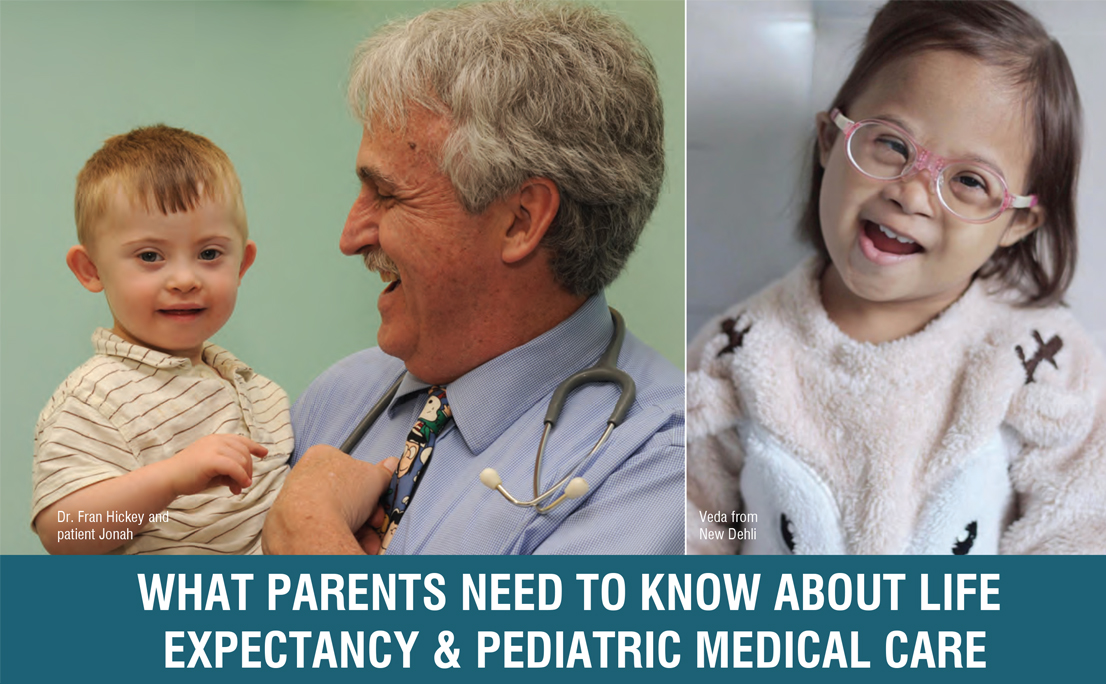









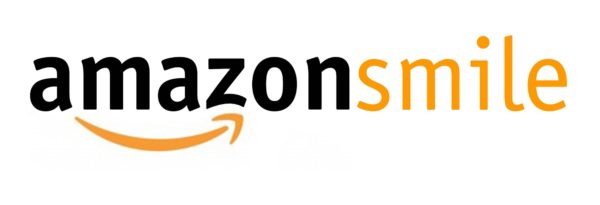
 Experience our inspirational and groundbreaking videos and photos. Our children and self-advocates are beautiful AND brilliant!
Experience our inspirational and groundbreaking videos and photos. Our children and self-advocates are beautiful AND brilliant! Make sure your local Representatives are on the Congressional Down Syndrome Task Force.
Make sure your local Representatives are on the Congressional Down Syndrome Task Force.